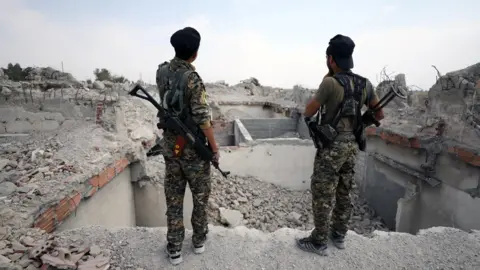Syria war: Assault on IS-held Raqqa in 'final stages'
 Reuters
ReutersA US-backed alliance of Kurdish and Arab fighters says it has driven Islamic State (IS) militants out of 80% of the northern Syrian city of Raqqa.
The Syrian Democratic Forces (SDF) announced that its three-month-old assault was now in its "final stages".
A monitoring group said heavy air strikes had forced militants to pull out of five areas in the past 48 hours.
Raqqa became the de facto capital of the "caliphate" whose creation was proclaimed by IS three years ago.
The provincial city was transformed by the group, which implemented an extreme interpretation of Islamic law there and used beheadings, crucifixions and torture to terrorise residents who opposed its rule.
At the same time, Raqqa became home to thousands of jihadists from around the world who heeded a call to migrate there by IS leader Abu Bakr al-Baghdadi.
About 15,000 SDF fighters, supported by US-led coalition air strikes and special forces, encircled Raqqa before launching an offensive to capture the city in June.
Despite fierce resistance from the thousands of militants who were believed to be holed up inside, about 60% of the city had been cleared by August.
At the start of this month, they took full control of the Old City and Great Mosque.
On Wednesday, the SDF said its fighters had opened a new front on the northern edge of Raqqa, describing this as "a feature of the final stages" of the campaign.
The Syrian Observatory for Human Rights, a UK-based monitoring group, reported that IS militants had withdrawn from several districts in the north and abandoned its grain silos and mills.
It estimated that the SDF had now retaken more than 90% of the city.

"After hundreds of their fighters were killed in recent weeks, the remaining IS fighters will not be able to resist much longer in Raqqa as their military equipment and basic necessities are dwindling," Syrian Observatory director Rami Abdul Rahman told AFP news agency.
Without food or medical equipment, the militants were unable to treat their own wounded and had retreated to the city centre, which they considered "the most secure", he said.
But Mr Abdul Rahman said the battle for the last 10% of the city would be tough because the jihadists had heavily mined the areas still under their control.
There is also concern for the fate of civilians trapped inside the last besieged areas, with IS militants accused of using them as human shields, and coalition air strikes reportedly causing high numbers of casualties.
Tens of thousands of civilians have fled the fighting in recent months. Estimates of the number still inside the city range from fewer than 10,000 to as many as 25,000.
